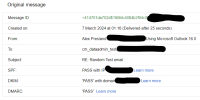Hello,
I didn't notice any long lines but I tried setting "smtp_line_length_limit = 0" anyway. There was no change so I believe my issue isn't related to long lines.
Perhaps someone could try to reproduce my issue using the steps further below? I'm using Plesk 18.0.58 Update #2 on CentOS 7 (for a little longer). I'm using Postfix and Warden.
I'm troubleshooting this because certain forwarded messages have broken DKIM signatures which causes DMARC failures.
I'm finding that the body of emails that contain 8bit characters, such as an ñ (Enyay), and are sent by the MUA (Thunderbird in my tests) using
are converted to
when forwarded (and only when forwarded). The forwarding can be to another mailbox on the same Plesk server, or to an external server.
The same message, if sent to a mailbox, on the Plesk server, without forwarding, is received as expected with
.
Steps to reproduce...
Bob
I didn't notice any long lines but I tried setting "smtp_line_length_limit = 0" anyway. There was no change so I believe my issue isn't related to long lines.
Perhaps someone could try to reproduce my issue using the steps further below? I'm using Plesk 18.0.58 Update #2 on CentOS 7 (for a little longer). I'm using Postfix and Warden.
I'm troubleshooting this because certain forwarded messages have broken DKIM signatures which causes DMARC failures.
I'm finding that the body of emails that contain 8bit characters, such as an ñ (Enyay), and are sent by the MUA (Thunderbird in my tests) using
Code:
Content-Transfer-Encoding: 8bit
Code:
Content-Transfer-Encoding: base64The same message, if sent to a mailbox, on the Plesk server, without forwarding, is received as expected with
Code:
Content-Transfer-Encoding: 8bitSteps to reproduce...
- Create a mailbox in Plesk ([email protected]) such that mail is delivered to that mailbox and also forwarded. Set the forwarding locations to include another mailbox on the same Plesk server ([email protected]) and some other email address not located on the Plesk server (perhaps a Gmail address).
- Using an external email account (different from any of the others) that signs outgoing messages with DKIM, compose a message, in Thunderbird, containing a single ñ (Enyay) in the body of the message and sent it to [email protected].
- Check the mail for [email protected] and examine the source of the message received. You should see
and the DKIM signature should remain valid.Code:
Content-Transfer-Encoding: 8bit - Check the mail for [email protected] and examine the source of the message received. Do you see, as I do,
and the DKIM is broken because the body was converted to BASE64 for an unknown reason.Code:
Content-Transfer-Encoding: base64 - Check the mail for the external email address and see the same thing.
and the DKIM is broken.Code:
Content-Transfer-Encoding: base64
Bob


